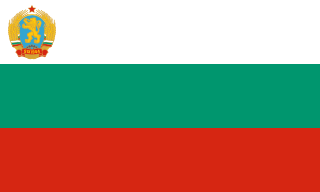
Bulgaria competed at the 1956 Summer Olympics in Melbourne, Australia and Stockholm, Sweden.
The men's Greco-Roman light heavyweight was a Greco-Roman wrestling event held as part of the Wrestling at the 1956 Summer Olympics programme. It was the tenth appearance of the event. Light heavyweight was the second-heaviest category, including wrestlers weighing 79 to 87 kilograms.
The men's freestyle featherweight competition at the 1952 Summer Olympics in Helsinki took place from 20 July to 23 July at Messuhalli. Nations were limited to one competitor. Featherweight was the third-lightest category, including wrestlers weighing 57 to 62 kilograms.
The men's Greco-Roman flyweight competition at the 1956 Summer Olympics in Melbourne took place from 3 December to 6 December at the Royal Exhibition Building. Nations were limited to one competitor. Flyweight was the lightest category, including wrestlers weighing up to 52 kilograms (114.6 lb).
The men's Greco-Roman bantamweight competition at the 1956 Summer Olympics in Melbourne took place from 3 December to 6 December at the Royal Exhibition Building. Nations were limited to one competitor. Bantamweight was the second-lightest category, including wrestlers weighing 52 to 57 kilograms.

The men's Greco-Roman featherweight competition at the 1956 Summer Olympics in Melbourne took place from 3 December to 6 December at the Royal Exhibition Building. Nations were limited to one competitor. Featherweight was the third-lightest category, including wrestlers weighing 57 to 62 kilograms.
The men's Greco-Roman lightweight competition at the 1956 Summer Olympics in Melbourne took place from 3 December to 6 December at the Royal Exhibition Building. Nations were limited to one competitor. Lightweight was the fourth-lightest category, including wrestlers weighing 62 to 67 kilograms.
The men's Greco-Roman welterweight competition at the 1956 Summer Olympics in Melbourne took place from 3 December to 6 December at the Royal Exhibition Building. Nations were limited to one competitor. Welterweight was the fourth-heaviest category, including wrestlers weighing 67 to 73 kilograms.
The men's Greco-Roman middleweight competition at the 1956 Summer Olympics in Melbourne took place from 3 December to 6 December at the Royal Exhibition Building. Nations were limited to one competitor. Middleweight was the third-heaviest category, including wrestlers weighing 73 to 79 kilograms.
The men's Greco-Roman heavyweight competition at the 1956 Summer Olympics in Melbourne took place from 3 December to 6 December at the Royal Exhibition Building. Nations were limited to one competitor. Heavyweight was the heaviest category, including wrestlers weighing over 87 kilograms (191.8 lb).

The men's freestyle flyweight competition at the 1956 Summer Olympics in Melbourne took place from 28 November to 1 December at the Royal Exhibition Building. Nations were limited to one competitor. Flyweight was the lightest category, including wrestlers weighing up to 52 kilograms (114.6 lb).

The men's freestyle bantamweight competition at the 1956 Summer Olympics in Melbourne took place from 28 November to 1 December at the Royal Exhibition Building. Nations were limited to one competitor. Bantamweight was the second-lightest category, including wrestlers weighing 52 to 57 kilograms.

The men's freestyle lightweight competition at the 1956 Summer Olympics in Melbourne took place from 28 November to 1 December at the Royal Exhibition Building. Nations were limited to one competitor. Lightweight was the fourth-lightest category, including wrestlers weighing 62 to 67 kilograms.
The men's freestyle welterweight competition at the 1956 Summer Olympics in Melbourne took place from 28 November to 1 December at the Royal Exhibition Building. Nations were limited to one competitor. Welterweight was the fourth-heaviest category, including wrestlers weighing 67 to 73 kilograms.
The men's freestyle middleweight competition at the 1956 Summer Olympics in Melbourne took place from 28 November to 1 December at the Royal Exhibition Building. Nations were limited to one competitor. Middleweight was the third-heaviest category, including wrestlers weighing 73 to 79 kilograms.
The men's freestyle light heavyweight competition at the 1956 Summer Olympics in Melbourne took place from 28 November to 1 December at the Royal Exhibition Building. Nations were limited to one competitor. Light heavyweight was the second-heaviest category, including wrestlers weighing 79 to 87 kilograms.
The men's freestyle heavyweight competition at the 1956 Summer Olympics in Melbourne took place from 28 November to 1 December at the Royal Exhibition Building. Nations were limited to one competitor. Heavyweight was the heaviest category, including wrestlers weighing over 87 kilograms (191.8 lb).

The men's Greco-Roman flyweight competition at the 1964 Summer Olympics in Tokyo took place from 16 to 19 October at the Komazawa Gymnasium. Nations were limited to one competitor.
The men's Greco-Roman featherweight competition at the 1964 Summer Olympics in Tokyo took place from 16 to 19 October at the Komazawa Gymnasium. Nations were limited to one competitor.

The men's freestyle featherweight competition at the 1964 Summer Olympics in Tokyo took place from 11 to 14 October at the Komazawa Gymnasium. Nations were limited to one competitor.







